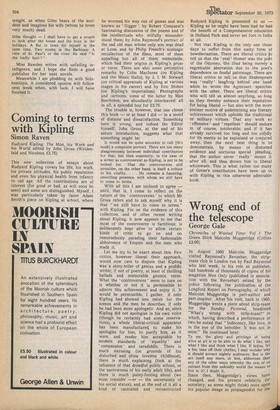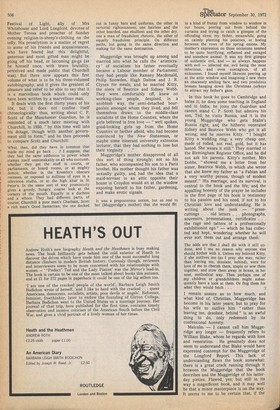Wrong end of the telescope
George Gale
Chronicles of Wasted Time: Vol 1: The Green Stick Malcolm Muggeridge (Collins £3.00) In August 1960 Malcolm Muggeridge visited Raymond's Revuebar, the striptease club in London run by Paul Raymond who last week, in his role as publisher, had hundreds of thousands of copies of his magazine Men Only (published in association with the Revuebar) seized by the police following the publication of the Longford Report on Pornography, of which Malcolm Muggeridge is part-author and part-inspirer. After his visit, back in 1960, Muggeridge wrote a piece about strip-tease for the Supday Pictorial, headlined "What's wrong with strip-tease?" in which, having described a performance or two he noted that "Indecency, like love, is in the eye of the beholder. It was not in mine." He continued later: To me, the glory and privilege of being alive at all is to be able to do what I like, saY what I like and think what I like. If ladies, for a fee, take off their clothes, I may wonder why it should attract nightly audiences. But is the act itself any more, or less, abhorrent than any of the other ways whereby the rest of us extract from this unkindly world the means to live in it? I doubt it.
Since then, Muggeridge's views have changed, and his present celebrity (nr notoriety, as some might think) rests upon his popular image as propagandist for the
Festival of Light, ally of Mrs Whitehouse and Lord Longford, devotee of Mother Teresa and preacher of Sunday evening religion-in-sheep's-clothing on the telly. His proselytism is a matter of regret to some of his friends and acquaintances, who have feared lest this delightful, generous and most gifted man might be going off his head, or becoming ga-ga (as he himself once, with brave brutality, perceived and made public that Churchill was). But there now appears this first volume of what is to be his three-volumed autobiography, and it gives the greatest of pleasure and relief to be able to say that it is a marvellous book which could only have been written by a marvellous man.
It deals with the first thirty years of his life, but it does not confine itself 4 chronologically: thus, writing about C. P. a Scott of the Manchester Guardian, he is 4 reminded of a much later meeting with Churchill, in 1950, "by this time well into his dotage, though with another government still to form," and he then proceeds to compare Scott and Churchill: What, then, did they have in common that made my mind go back . . .? I suppose, that they had the same addiction to power which stamps itself unmistakably on all who succumb, whether they get the stuff in courts, or parliaments, or board rooms, or at mighty demos; whether in the Kremlin's obscure recesses, or exposed to millions of eyes in a television studio, or at the high altar in St Peter's. In the same sort of way promiscuity gives a greedy, hungry, coarse look at the corners of the mouth. Equally in a duchess and a whore. They had different parts, of course; Churchill a poor man's Chatham, Scott 4 a rich man's Good Samaritan; the one decked
out in funny hats and uniforms, the other in sartorial righteousness; one hairless and the other bearded, one ebullient and the other dry, one a man of fraudulent rhetoric, the other of equally fraudulent principle. On different paths, but going in the same direction and making for the same destination.
Muggeridge was brought up among and married into what he calls the ' aristocracy' of socialism: his father eventually became a Labour member of Parliament; they had people like Ramsey Macdonald, Philip Snowden, Hugh Dalton and J. R. Clynes for meals; and he married Kitty, the niece of Beatrice and Sidney Webb. They were comfortably off, knew no working-class people, despised, in a snobbish way, the semi-detached bourgeoisie amongst whom they lived, and felt themselves drawn to the middle-class socialists of the Home Counties, where the girls believed in free love — "well spoken, good-looking girls up from the Home Counties or farther afield, who had become convinced by the New Statesman, or maybe some itinerant university extension lecturer, that they had nothing to lose but
their virginity . ."
Muggeridge's mother disapproved of all this sort of thing strongly; not so his father, who accompanied his son to a Paris brothel. His mother thought his father was sexually guilty, and had the idea that a maid-servant in an attic opposite their house in Croydon would sit at the window exposing herself to his father, gardening, and make erotic signals.
It was a preposterous notion, but so real to her (Muggeridge's mother) that she would flit
in a kind of frenzy from window to window in our house, peering out from behind the curtains and trying to catch a glimpse of the offending siren; my father, meanwhile, going on calmly planting his potatoes, or hoeing between the rows of his spring onions. My mother's expression on these occasions seemed to be quite horrifying; enflamed and enraged and somehow animal. It was my first glimpse of authentic evil, and — as always happens with evil — infected me, evil being the most infectious, and even contagious, of all sicknesses. I found myself likewise peering up at the attic window and imagining I saw there an obscenely smiling face, and two pendulous breasts hanging down like Christmas turkeys to attract my father's gaze.
In this book he goes to Cambridge and hates it; he does some teaching in England and in India; he joins the Guardian and cannot stand C. P. Scott but admires his son, Ted; he visits Russia, and it is the young Muggeridge who gets Stalin's Russia right, and, the hitherto venerated Sidney and Beatrice Webb who got it all wrong; and he marries Kitty. "I bought Kitty a wedding ring; a very cheap one, made of rolled, not real, gold, but it has lasted. She wears it still." They married the Birmingham Register Office, and he did not ask his parents. Kitty's mother, Mrs Dobbs, "showed me a letter from her sister, Beatrice Webb, in which she wrote that she knew my father as 'a Fabian and a very worthy person, though of modest means'." His marriage, and its survival, is central to the book and the life; and the appalling honesty of the prayer he includes in the first page of his book is testimony to his passion and his need, if not to his Christian love and understanding. He is writing about the junk — " presscuttings . . . old letters . . . photographs, souvenirs, presentations, certificates . . . the rags and tatters of a professionally exhibitionist ego" — which he has collected and kept, wondering whether he will ever sort them out and arrange theni: The odds are that I shall die with it still undone, and I see no reason why anyone else should bother with it. Unless my beloved Kitty, if she outlives me (as I pray she may, rather than leaving me, desolate, behind), were for love of me to cherish them, staple or sew them together, and stow them away in boxes, in her neat, methodical way. Then perhaps one of my children or grandchildren might subsequently have a look at them. Or flog them for what they would fetch . . .
I remain unsure as to how much, and what kind of, Christian, Muggeridge has become in his later years; but to pray for his wife to outlive him " rather than leaving me, desolate, behind " is an awful thing to do, only redeemed by its confessional honesty.
Malcolm — I cannot call him Muggeridge any longer — frequently refers to William Blake, whom he regards with love and veneration. He genuinely does not seem to understand that Blake would have expressed contempt for the Muggeridge of the Longford Report. This lack of understanding flaws the book somewhat: there is a great crack running through it bztween the Muggeridge that the book describes and the Muggeridge of his latterday pieties. Flawed, yes; but still •in its way a magnificent book, and it may well be that a minor masterpiece is on the way. It seems to me to be certain that, if the completed autobiography turns out to be as good as this first volume promises, it will celebrate the precise opposite of what it will be ostensibly recording, and will chronicle an intellectual degeneration so brilliantly that the real waste, the recent descent into moral flippancy, will be proved by the excellence of the apologetic seeking to establish the opposite. The time was not wasted which produced the life and writing of this chronicle.












































 Previous page
Previous page